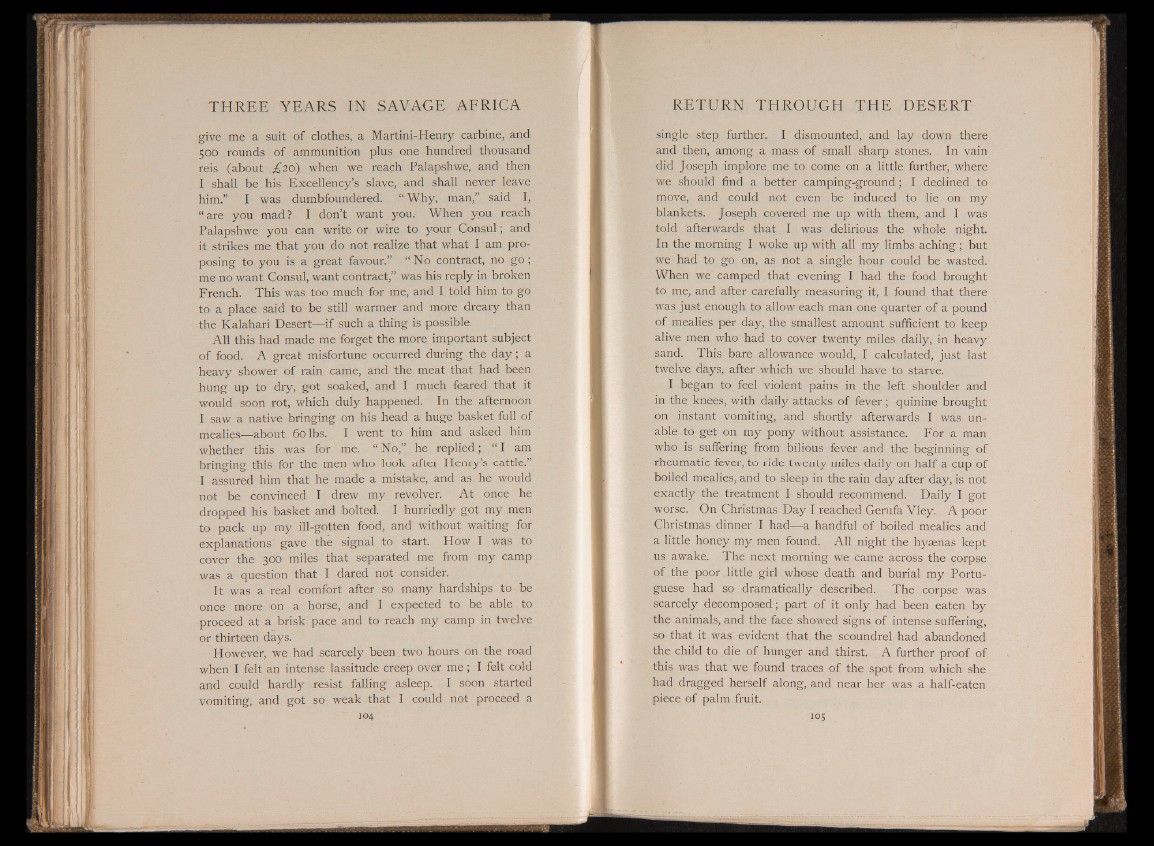
give me a suit of clothes, a Martini-Henry carbine, and
500 rounds of ammunition plus one hundred thousand
reis (about £ 20) when we reach Palapshwe, and then
I shall be his Excellency’s slave, and shall never leave
him.” I was dumbfoundered. “ Why, man,” said I,
“ are you mad? I don’t want you. When you reach
Palapshwe you can write or wire to your Consul; and
it strikes me that you do not realize that what I am proposing
to you is a great favour.” “ No contract, no go ;
me no want Consul, want contract,” was his reply in broken
French. This was too much for me, and I told him to go
to a place said to be still warmer and more dreary than
the Kalahari Desert—if such a thing is possible.
All this had made me forget the more important subject
of food. A great misfortune occurred during the day; a
heavy shower of rain came, and the meat that had been
hung up to dry, got soaked, and I much feared that it
would soon rot, which duly happened. In the afternoon
I saw a native bringing on his head a huge basket full of
mealies—about 60 lbs. I went to him and asked him
whether this was for me. “ No,” he replied; “ I am
bringing- this for the men o o who look after Henry’s cattle.”
I assured him that he made a mistake, and as he would
not be convinced I drew my revolver. At once he
dropped his basket and bolted. I hurriedly got my men
to pack up my ill-gotten food, and without waiting for
explanations gave the signal to start. How I was to
cover the 300 miles that separated me from my camp
was a question that I dared not consider.
It was a real comfort after so many hardships to be
once more on a horse, and I expected to be able to
proceed at a brisk pace and to reach my camp in twelve
or thirteen days.
However, we had scarcely been two hours on the road
when I felt an intense lassitude creep over me; I felt cold
and could hardly resist falling asleep. I soon started
vomiting, and got so weak that I could not proceed a
104
single step further. I dismounted, and lay down there
and then, among a mass of small sharp stones. In vain
did Joseph implore me to come on a little further, where
we should find a better camping-ground; I declined to
move, and could not even be induced to lie on my
blankets. Joseph covered me up with them, and I was
told afterwards that I was delirious the whole night.
In the morning I woke up with all my limbs aching; but
we had to go on, as not a single hour could be wasted.
When we camped that evening I had the food brought
to me, and after carefully measuring it, I found that there
was just enough to allow each man one quarter of a pound
of mealies per day, the smallest amount sufficient to keep
alive men who had to cover twenty miles daily, in heavy
sand. This bare allowance would, I calculated, just last
twelve days, after which we should have to starve.
I began to feel violent pains in the left shoulder and
in the knees, with daily attacks of fever; quinine brought
on instant vomiting, and shortly afterwards I was unable
.to get on my pony without assistance. For a man
who is suffering from bilious fever and the beginning of
rheumatic fever, to ride twenty miles daily on half a cup of
boiled mealies, and to sleep in the rain day after day, is not
exactly the treatment I should recommend. Daily I got
worse. On Christmas Day I reached Gerufa Vley. A poor
Christmas dinner I had—a handful of boiled mealies and
a little honey my men found. All night the hyaenas kept
us awake. The next morning we came across the corpse
of the poor little girl whose death and burial my Portuguese
had so dramatically described. The corpse was
scarcely decomposed; part of it only had been eaten by
the animals, and the face showed signs of intense suffering,
so that it was evident that the scoundrel had abandoned
the child to die of hunger and thirst. A further proof of
this was that we found traces of the spot from which she
had dragged herself along, and near her was a half-eaten
piece of palm fruit.
i °5